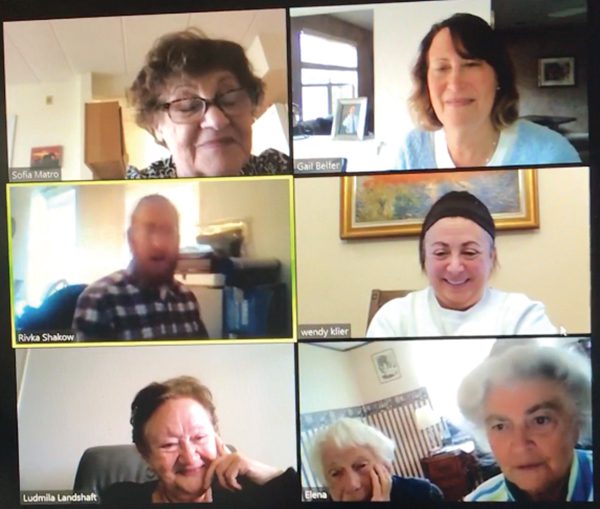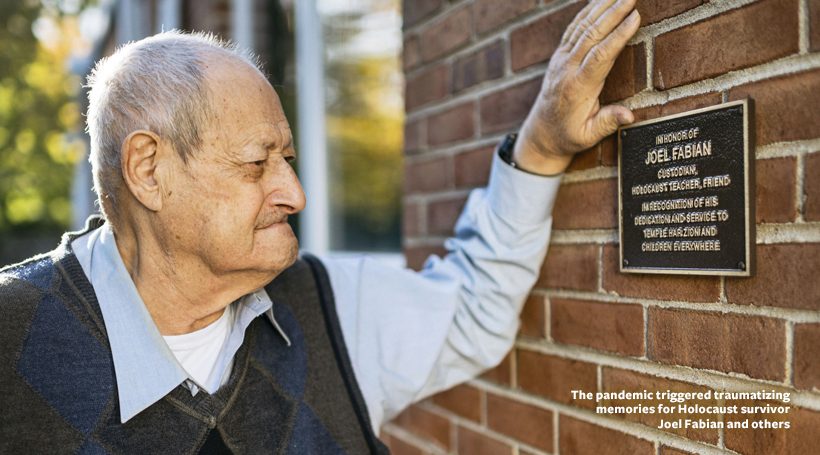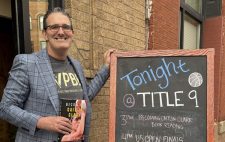PHOTOGRAPHY BY DAVID MICHAEL HOWARTH
Willingboro resident Joel Fabian will tell you he has had a lucky life. He points to the many times he evaded death, first in a concentration camp during the Holocaust and then, following the war, overcoming a critical case of tuberculosis. Still later, he survived an ambush as an American soldier during the Vietnam War. That ambush wiped out most of his Army unit, but he survived.
But luck, Fabian says, doesn’t stop the nightmares. Confined to his home at the height of the pandemic and seeing grim images – shuttered businesses and schools, hospitals being overrun as well as rioting in American cities – triggered memories of the isolation and helplessness he experienced during dark times of his past.
“It took me back to Nazi Germany and the restrictions they had on people,” says Fabian, who was just a child when his family was sent from their home in Berlin, Germany, to the Theresienstadt concentration camp in the modern-day Czech Republic in 1943. “Jews couldn’t go anywhere. We were only allowed in certain areas. It brought all of that back.”
Fabian is working through the trauma with intensive help from Jewish Family & Children’s Service (JFCS), which serves about 160 Holocaust survivors in South Jersey. During the pandemic, the group had to radically restructure programs for this vulnerable, aging population.
“In normal, pre-Covid times, we’d have social workers, nurses and home care aids visiting folks,” says Gail Belfer, director of Holocaust survivor services and advocacy at JFCS. “We used to have regular counseling sessions, in-person monthly luncheons with entertainment, outings and all kinds of events.”
When in-person programs had to be suspended, Belfer figured the survivors would be disappointed, but she didn’t fully realize the impact.
“What they’ve experienced over the past year with Covid draws parallels to how they survived the Holocaust. But they’ve been through so much worse,” she says. “We thought: they have what they need, they’re going to be fine. Then we started to see the cracks in the armor. It would come in waves when it would hit them that this is not a short-term situation.”
“The riots, unrest, cars and buildings on fire brought on many nightmares,” she adds. “While many of our clients did heed our advice to shut the TV off, they were afraid with so much social unrest. They worried that they were not safe in America.” For Fabian, the parallels to Covid were even more direct. By the time the Russians arrived and liberated his concentration camp, typhus and tuberculosis were rampant. Fabian wound up with tuberculosis and was sent to a sanatorium in Switzerland, where he was alone for 3 years.
Before March, he made ends meet by cleaning doctors’ and lawyers’ offices. Although the offices reopened in June after the state shutdown, he was left behind. “With the strict rules on cleaning that required special equipment, training and certifications,” he says, “I couldn’t take them back.”
But that wasn’t the only part of his life interrupted. Fabian was passionate about his role as a witness to history and one of just a handful of survivors still healthy enough to remain active in Holocaust education programs. Over the years, he found purpose telling his story to thousands of schoolchildren in South Jersey. Those live presentations are still on hold, as are the programs he attended with fellow survivors.
Belfer and her team knew that delivering food and medicine and providing survivors financial aid would not be enough to help them cope with the nightmares. Knowing it was vital to re-establish survivor connections to each other and rekindle their sense of safety and hope, Belfar says the obvious solution was to go virtual. But teaching computer skills to survivors – the youngest of them in their late 70s – was a major challenge.
“It took a lot of coaching and encouragement,” she says. “Some were more tech savvy than others. We had volunteers and staff helping them troubleshoot.”
Fabian admits he was one of the harder cases. “I’m about as un-tech savvy as can be, and at 81, a little reluctant with learning anything new,” he says. “But with the Zooming, I’ve got it made.”
In addition to running virtual get-togethers twice a week for the survivors, volunteers also check in constantly by phone and deliver letters that local children create to cheer them up.
With survivors from many different countries, including Poland, Hungary, Ukraine and Russia, another hurdle was the language barrier. JFCS recruited Yiddish-speaking, Hebrew-speaking and Russian speaking volunteers to provide more personal contact.
“They sing and play Jewish songs that bring good memories,” Belfar says of their virtual meetups. “The volunteers call survivors on a regular basis to check in and see how they’re doing.”

Zoom meetings helped Holocaust survivors re-establish their connection with each other
For Ludmila Landshaft, who was evacuated from Moscow, Russia to Uzbekistan with her mother, brother and cousins during the war, the isolation of the pandemic was nearly unbearable, bringing back a flood of memories of her early life.
Landshaft’s father was drafted into the Russian army and killed in action in 1942. Being away from home in an unfamiliar place was difficult, but it was all bearable because they had each other, Landshaft says through her daughter Maria.
“It was the opposite of this,” says Maria. “They were together, supporting each other. They weren’t alone. They had support systems, and it’s why they survived.”
When she moved to the United States 5 years ago, Landshaft built her own support system. “Until the pandemic, I had to schedule time ahead to be with my mom, because she was so busy,” Maria says. “She constantly had activities, excursions, dinners.”
Having to separate from her friends, Landshaft struggled with feelings of depression, exacerbated by a language barrier that made it difficult to talk to anyone by phone, says Maria.
Belfer says JFCS has created even more resources to overcome that challenge. “We’re trying to do things specifically for our Russian-speaking survivors,” she says. “We’re even developing a Russian language newsletter to send out.”
With most survivors now vaccinated, it’s easier for them to see a way out of the isolation, and that’s helping, says Belfar. In the meantime, the intensive virtual programming continues.
“During the Holocaust they felt alone, they felt unsupported because most of the world was silent,” she says. “They may be by themselves in their homes, but they are not alone. We are their advocates. We are with them.”














